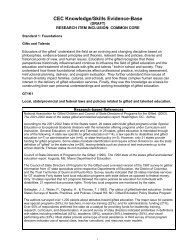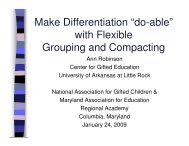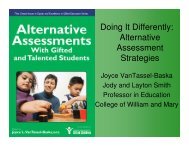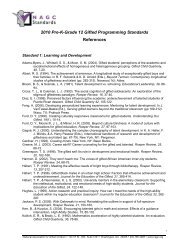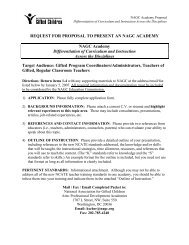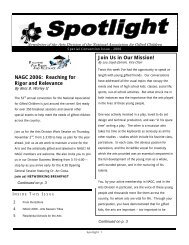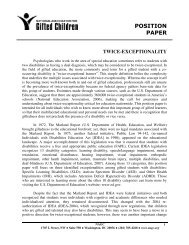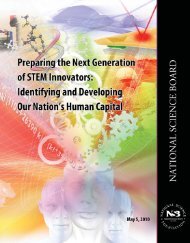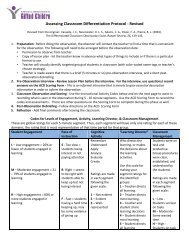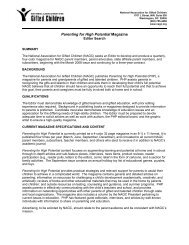No Child is Just Born Gifted - NAGC
No Child is Just Born Gifted - NAGC
No Child is Just Born Gifted - NAGC
You also want an ePaper? Increase the reach of your titles
YUMPU automatically turns print PDFs into web optimized ePapers that Google loves.
whether expressed in cognitive abilities suchas the capacity to generalize, conceptualize,or reason abstractly, or in specific abilitiessuch as creative behavior, results from theinteraction between inherited and acquiredcharacter<strong>is</strong>tics. Th<strong>is</strong> interaction encompassesall of the physical, mental, andemotional character<strong>is</strong>tics ofthe person and all of thepeople, events, and objectsentering the person’sawareness. Our reality <strong>is</strong>unique to each of us.What Is MoreImportant,Nature orNurture?An endless interactionbetween theenvironment andour genetic frameworkcreates our intelligence,even our perception ofreality. Th<strong>is</strong> process beginsvery early, as soon as thefertilized egg attaches to thewall of the uterus. As thecells divide and the fetusbegins to grow, the environmentalready begins to exerta determining influence.One could not say from th<strong>is</strong>interactive point of viewwhich <strong>is</strong> more important —the inherited abilities or theenvironmental opportunitiesto develop them.Restriction on either nature(genes) or nurture (environment)would inhibit the high levels ofactualized intellectual ability we callgiftedness.Our genes are not a limit, but providea rough outline of the possibilities for ourlife. While genes provide us with our ownunique menu, the environment makes theactual selection within that range ofchoice. Any reference to “High-IQ genes”must be seen as a m<strong>is</strong>nomer because thed<strong>is</strong>cernible character<strong>is</strong>tics of an organ<strong>is</strong>malways depend on its particular environmentalh<strong>is</strong>tory.Environmental interaction with thegenetic program of the individual occurswhether planned or left to chance. Byconservative estimates, th<strong>is</strong> interaction canresult in a 20- to 40-point difference inmeasured intelligence. Teachers andparents must be aware that how westructure the environment for childrenchanges them neurologically and biologically.Without opportunities for appropriatechallenge, talent and ability may belost. From an overwhelming body ofresearch, we must conclude that thedevelopment of intelligence includes bothnature AND nurture.Who Are <strong>Gifted</strong> Learners?At birth the human brain containssome 100 to 200 billion braincells. Each neural cell <strong>is</strong> in placeand ready to be developed, ready to beused for actualizing the highest levels ofhuman potential. With a very smallnumber of exceptions, all human infantscome equipped with th<strong>is</strong> marvelouscomplex heritage.For example, two individuals withapproximately the same genetic capacity9for developing intelligence could beregarded as potentially gifted or aseducably retarded as a result of theenvironment with which they interact.While we never develop more neural cells,it <strong>is</strong> estimated that we actually use lessthan 5 percent of our brain capability.How we use th<strong>is</strong> complexsystem becomes critical toour development of intelligenceand personality and tothe very quality of life weexperience as we grow.Those who work with giftedchildren must acquire anunderstanding of the powerof the interaction betweenthe organ<strong>is</strong>m and itsenvironment.When the brain becomesmore accelerated andadvanced in its functionthrough th<strong>is</strong> interaction, theindividual shows character<strong>is</strong>ticsthat can be identifiedwith high intelligence. Someof those character<strong>is</strong>tics canbe seen as the direct result ofchanges in brain structures.These changes continue tooccur as long as appropriatestimulation <strong>is</strong> available. Overand over brain researchpoints to the dynamic natureof the brain’s growth and theneed to challenge theindividual at that individual’slevel of development forgrowth to continue. Unchallenged,the individual willlose brain power.Although each child will expressgiftedness in h<strong>is</strong> or her unique way,behaviors often observed among thesechildren include intense curiosity,frequent and soph<strong>is</strong>ticated questions, anaccelerated pace of thought and learning,complex thinking, often connectingseemingly d<strong>is</strong>parate ideas, pers<strong>is</strong>tence inpursuing interests, and early developmentof language and mathematical skills.Emotionally gifted children mayshow a heightened awareness of “beingdifferent,” unusual sensitivity to theexpressed feelings and problems of others,early concern for global and abstract<strong>is</strong>sues, ideal<strong>is</strong>m and concern for fairness



